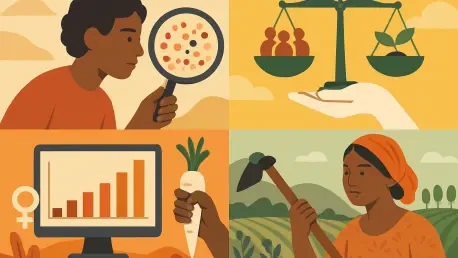In the rapidly evolving world of agricultural research, a transformative framework known as Data Feminism is emerging as a powerful force for promoting equity and fairness. This innovative approach, recently explored by Nichols and colleagues in a notable publication, fundamentally rethinks the ways in which data is collected, analyzed, and applied within the agricultural sector by placing social justice and community engagement at its core. Unlike traditional methods that often reinforce existing inequalities by marginalizing groups such as smallholder farmers and women, Data Feminism seeks to address these disparities head-on. It challenges the notion that data is a neutral entity, instead recognizing its deep ties to social and political contexts. By doing so, it aims to ensure that data-driven innovations benefit all stakeholders, not just a select few. The potential of this framework lies in its ability to reshape research practices into tools for empowerment, offering a clear path for scientists and policymakers to build food systems that are not only sustainable but also inherently just. As global challenges like food insecurity and climate change intensify, Data Feminism sparks a crucial dialogue about how data can be harnessed to create a more inclusive future for agriculture, where no voice is left unheard and no community is overlooked.
Challenging Conventional Data Practices
Data Feminism brings a critical lens to long-standing practices in agricultural data collection and analysis, revealing how they often perpetuate systemic inequities. Traditional methods frequently prioritize industrial farming systems and high-yield crops, inadvertently sidelining smaller, marginalized farmers whose needs and knowledge are equally vital. This selective focus not only deepens existing disparities in access to resources but also misses out on localized insights that could enhance research outcomes. By scrutinizing the biases embedded in every stage of the data lifecycle—from gathering to interpretation—this framework urges a fundamental shift. It calls for methodologies that actively counteract these imbalances, ensuring that the benefits of agricultural advancements are distributed more equitably across diverse farming communities.
Beyond merely identifying flaws, Data Feminism advocates for practical solutions through the adoption of participatory research methods. Rather than relying exclusively on remote sensing technologies or statistical models that can overlook human context, this approach emphasizes the direct involvement of farmers and local communities. Techniques such as community-led surveys and narrative storytelling are encouraged to capture the nuanced realities of those on the ground. This integration of qualitative insights with quantitative data creates a richer, more comprehensive understanding of agricultural challenges. Such a balanced methodology ensures that solutions are not only technically sound but also deeply relevant to the lived experiences of the people they aim to support, fostering a more inclusive research environment.
Building Transparency and Trust in Technology
A cornerstone of Data Feminism in agricultural research is the push for transparency in data systems, particularly in the use of advanced technologies like artificial intelligence (AI). Predictive models for crop yields, pest outbreaks, and soil health often operate as black boxes, with algorithms that are difficult to understand or scrutinize. When these systems harbor hidden biases, they risk favoring certain groups or practices over others, thereby exacerbating inequities in the sector. By advocating for explainable AI, this framework seeks to make these processes more accessible and accountable. Transparent systems allow researchers to identify and correct biases, ensuring fairness in outcomes while also building confidence among farmers and other stakeholders who rely on these tools for decision-making.
Equally important is the concept of data sovereignty, which Data Feminism champions as a means of empowering communities. This principle asserts that local farmers and indigenous groups should retain control over their own data, safeguarding their knowledge and rights. Emerging technologies like blockchain are highlighted as potential solutions for secure, ethical data sharing, ensuring transparency in how information is managed and used. By prioritizing accountability, this approach helps bridge the divide between cutting-edge innovations and the individuals they are meant to serve. Trust becomes a vital byproduct of such transparency, encouraging wider adoption of agricultural technologies and fostering collaborative relationships between researchers, policymakers, and farming communities across diverse regions.
Addressing Complex Identities Through Intersectionality
Data Feminism introduces intersectionality as a critical tool for understanding the multifaceted barriers faced by individuals in agriculture, recognizing that social identities such as gender, ethnicity, and economic status often overlap to create unique challenges. A uniform, one-size-fits-all approach to agricultural interventions frequently fails to address these layered disparities, leaving certain groups at a disadvantage. By employing sophisticated statistical methods alongside sociological analysis, researchers can uncover specific obstacles that vary across demographics. This framework enables the design of targeted solutions that account for the complex interplay of factors affecting access to resources like land, credit, and technology, ensuring that interventions are both precise and impactful for those most in need.
The significance of this tailored approach cannot be overstated, especially when considering the distinct struggles of diverse agricultural stakeholders. For example, a female farmer from a low-income ethnic minority may face compounded barriers that differ significantly from those of other farmers in her region. Data Feminism equips researchers with the analytical tools to dissect these unique circumstances, moving beyond broad generalizations to create policies and programs that directly address specific inequities. This focus on intersectionality not only enhances the effectiveness of agricultural research but also ensures that progress in the sector leaves no one behind, promoting a more equitable distribution of opportunities and benefits across the entire food production landscape.
Bridging Social Equity and Environmental Health
Another profound aspect of Data Feminism is its integration of social justice with environmental sustainability, arguing that data practices ignoring human diversity can also undermine ecological balance. Many big data applications in industrial farming prioritize efficiency and output at the expense of long-term environmental health and community well-being. In contrast, this framework promotes regenerative agricultural practices through participatory monitoring systems, often utilizing low-cost sensors managed by local farmers. By focusing on both people and the planet, such methods ensure that agricultural advancements support ecological resilience while also addressing the social needs of farming communities, creating a more holistic approach to food system challenges.
This dual emphasis is further reinforced by expanding the scope of data collection to include metrics beyond traditional crop yields. Indicators such as biodiversity, carbon sequestration, and community health are tracked alongside productivity to provide a fuller picture of sustainability. Aligning with global priorities for climate resilience and food security, Data Feminism positions itself as a strategic ally in tackling interconnected crises. By valuing both social equity and environmental stewardship, it offers a comprehensive framework for researchers to develop solutions that are sustainable in the truest sense—benefiting ecosystems while uplifting the most vulnerable populations within agricultural systems, thus ensuring a balanced path forward for future generations.
Shaping Future Policies and Practices
Looking back, the exploration of Data Feminism in agricultural research marked a pivotal shift toward equity and inclusion, as it redefined how data could serve as a tool for justice. The framework’s emphasis on participatory methods, transparent technologies, and intersectional analysis provided a robust foundation for addressing systemic disparities in food systems. Its commitment to linking social fairness with environmental sustainability inspired a wave of innovative practices, from community-driven data initiatives to policies that prioritized marginalized voices. Reflecting on these developments, it’s evident that Data Feminism laid critical groundwork for transforming agriculture into a field that valued every stakeholder.
Moving forward, the next steps involve scaling these principles through collaborative efforts across sectors, ensuring that the lessons learned continue to influence research and policy. Policymakers are encouraged to adopt inclusive data governance models that empower communities, while researchers need to integrate ethical considerations into technological advancements. Educational reforms are also deemed essential, equipping future scientists with the skills to blend data science with social justice perspectives. By investing in interoperable data systems and fostering cross-disciplinary partnerships, the agricultural sector can build on past insights to create resilient, just, and sustainable food systems for years to come.









